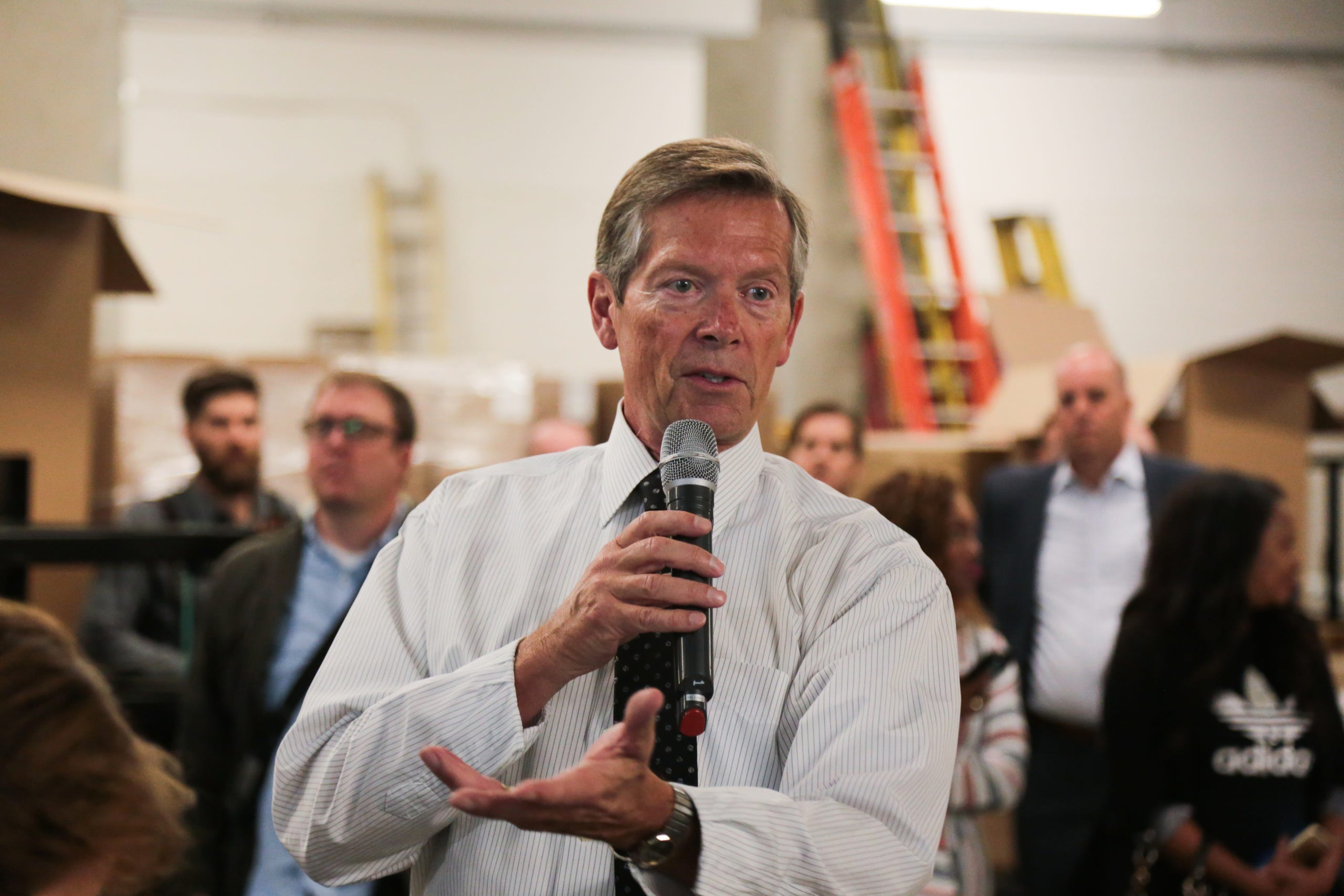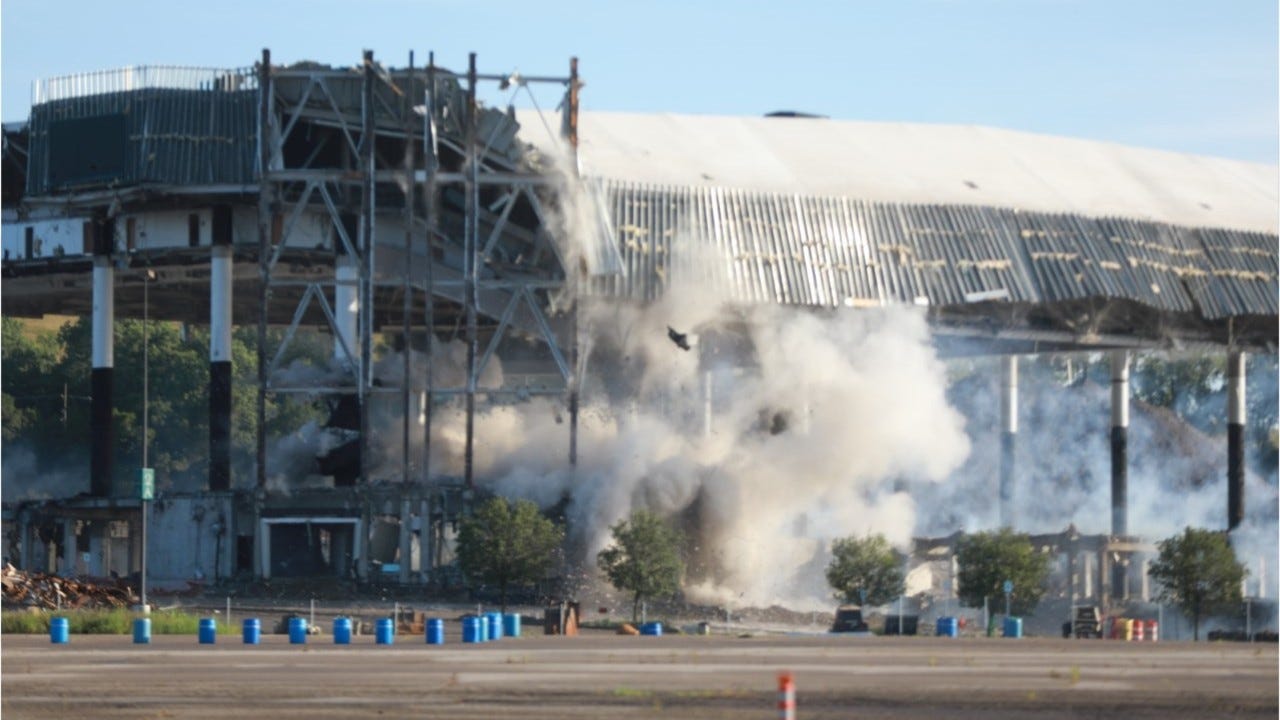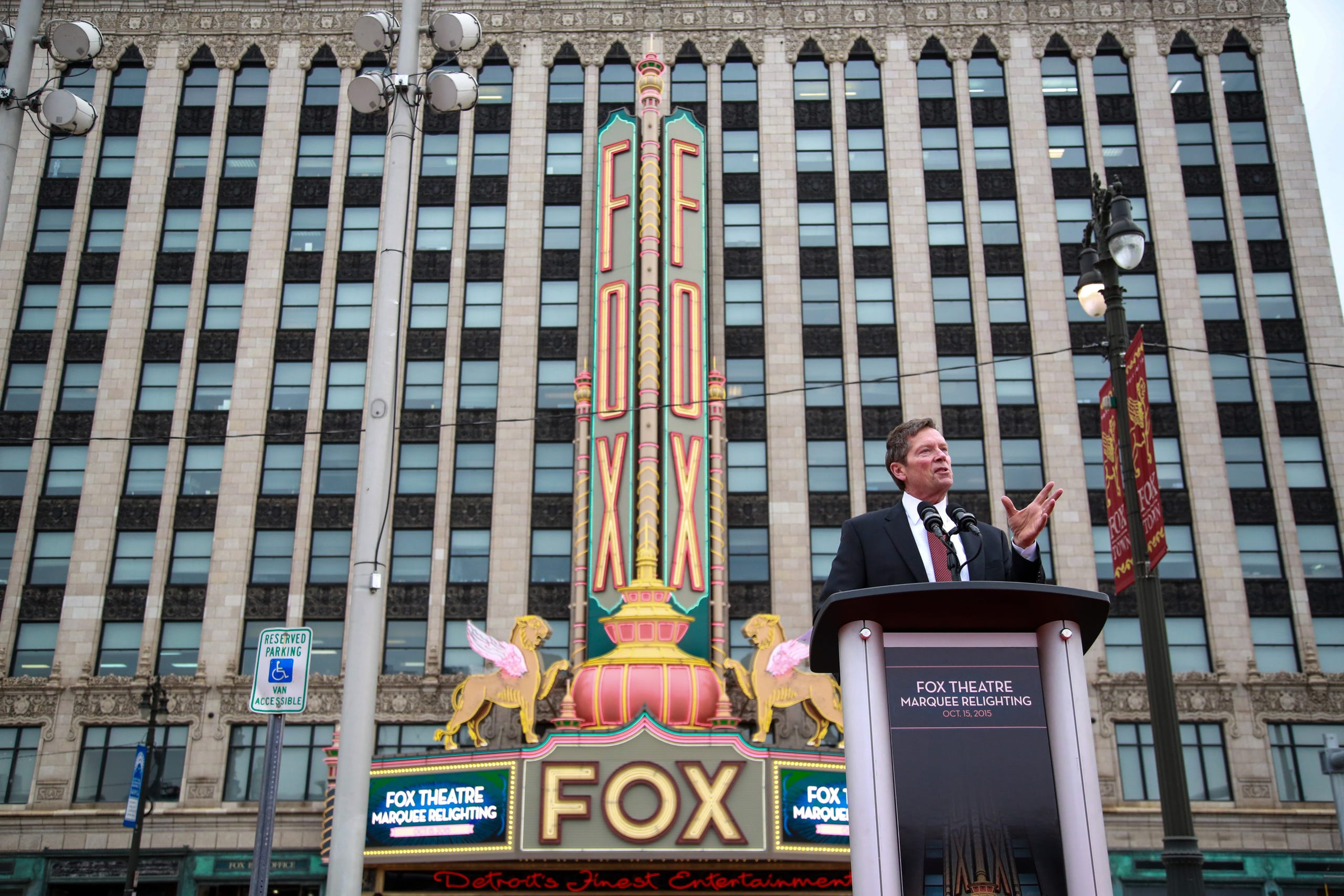How Tom Wilson went from failed Hollywood actor to Detroit sports executive savant
Bill Dow | Special to Detroit Free Press
On New Year’s Eve, Tom Wilson, one of the nation’s most respected and innovative sports marketing and entertainment executives, retired as President Emeritus of Olympia Entertainment, the company that runs the Red Wings, Tigers, and three, 313 Presents entertainment venues.
Prior to his 10 years with the Ilitch organization, where he helped lead and facilitate the planning and construction of Little Caesars Arena, Wilson spent 32 years as then-Pistons owner Bill Davidson’s right-hand man.
As president and chief executive officer of Palace Sports and Entertainment, he led the construction of the Palace of Auburn Hills, and helped Davidson became the first owner in sports history to win four championships in four different leagues in the same season: In 2003-04, the Pistons won their third NBA title, the Tampa Bay Lightning their first Stanley Cup, the Detroit Shock won their first of three WNBA titles, and the Tampa Bay Storm won the Arena Football League title. At the same time, Wilson successfully led the renovation and management of the DTE Energy Music Theatre — the number one outdoor music venue in the country for 19 consecutive years — and the Meadow Brook Music Festival.

Tom Wilson talks with media while giving a tour of Little Caesars Arena in downtown Detroit on Sept. 6, 2017.
RYAN GARZA, DETROIT FREE PRESS
Wilson’s improbable rise to the top mirrors the ascendency of the Pistons from long-time NBA basement dwellers to an admired world champion franchise.
Raised as an only child by his mother in a rented upper flat near Woodward and Six Mile, after his father abandoned the family when Wilson was a year old, he graduated from Detroit Cass Tech as a co-op student, before paying his way through Wayne State, the final two years as a night student where he majored in business and minored in drama.
Upon graduation in 1971, he moved to Hollywood, where he struggled as an actor landing minor roles on television shows including Room 222 and The Partridge Family. Disenchanted with acting, he worked two years in ticket sales for the Los Angeles Lakers, returning to Detroit in 1978 at 28, where he became director of sales and marketing for the Pistons. He was named CEO just eleven years after graduating from Cass Tech.
Wilson led the struggling Pistons from Cobo Arena to the Pontiac Silverdome and implemented an aggressive and innovative marketing campaign that lured fans into the massive football stadium. Upon the arrival of Isiah Thomas and the corps of a team that would become the “Bad Boys,” the Pistons began to flourish with a growing fan base. But they needed their own arena.

Detroit Pistons owner Bill Davidson, 2007.
ERIC SEALS, DETROIT FREE PRESS
With Davidson’s $80 million and no public financing, Wilson led the design of the pioneering “bunker suites,” while creating innovative sponsorship opportunities that soon became the template for area construction across North America.
After Davidson’s death in 2009, Wilson was hired by Chris Ilitch in 2010 to help revitalize the family’s entertainment empire and build what became Little Caesars Arena.
In mid-January, two weeks after his retirement, Wilson spoke with the Free Press and reflected on his career.
On retirement

President and CEO of Olympia Entertainment, Tom Wilson talks about the new Detroit Red Wings arena during an interview Jan. 28, 2016, in Detroit.
SALWAN GEORGES, DETROIT FREE PRESS
“Around the time of building Little Caesars Arena, the Ilitch family wanted to hire a right-hand guy who could learn from me and eventually take over my position. I gave them a list of ten names and one was Chris Granger, who they especially liked. By the time Chris was hired, all the revenue streams for the LCA were set. The suites were all leased, the club seats sold and long-term sponsorship commitments were solidified. It was then a good time to begin handing off responsibilities to Chris. Working from home with the pandemic the last 9 months kind of prepared me, as I didn’t have to commute every day to the office, so now it’s kind of cold turkey time. A lot of people have reached out to me in the last two weeks and I have already done some consulting. It will be an interesting next chapter, but I don’t envision myself doing 70-hour weeks anymore.”
Growing up an avid Detroit sports fan
“Around 12, I began taking the bus to Tiger Stadium, Cobo Arena, and Olympia Stadium. Like a lot of kids in my generation, I was a Gordie Howe and Al Kaline fan, and with the Lions, it was Joe Schmidt and the Fearsome Foursome. At Tiger Stadium, I would sit in right field stands and enjoy watching Kaline warm up and marvel at his arm. At Cobo Arena, it was exciting to see Dave Bing arrive as an elite player for the Pistons. At that age, I read the book "Veeck As In Wreck," about the innovative baseball owner Bill Veeck who brought fun to the game, like giving a little person an at bat for the St. Louis Browns. I remember thinking that has got to be the greatest thing to make a living like that in sports and come up with crazy ideas. I never dreamed that I might be sitting in shoes like that someday.”
Leaving acting in Hollywood to work for Lakers, Pistons

Olympia Entertainment's Tom Wilson looks over a Detroit diorama featuring the new downtown arena (at right).
BRIAN MCCOLLUM, DETROIT FREE PRESS
“When you audition to be the back of someone else’s head and don’t get the part, and play a dead Indian lying in the desert on top of a fake dead horse you start to think, ‘you know this might not be working out.’ I was playing a basketball player filming an episode of Barnaby Jones at the Forum and during the breaks, I played basketball with some of the promotions people for the Lakers. They had an opening in the marketing department so I went for it. They gave me a phone book and I started selling season tickets and left after two years as sales director. I needed to get out of L.A. because I did not want to be tempted to try acting again, so I sold a spec home I was building in Malibu and left for Detroit without a job. There were six people in the front office of the Pistons and I was hired for $14,000 to sell season tickets. Two months later, the sales and marketing director decided to return to Phoenix and I got the job. I was too young and inexperienced but a year later, Bill Davidson named me CEO. Bill had the ability to see what you could be more than what you were.”
Building a fan base for Pistons
“We were awful and in our first year in the Silverdome (1979-80) we won 16 games. Somehow, we needed to get fans to come out. We started off with Marathon Oil, who bought 20,000 upper-level tickets against great teams like the Celtics and 76ers at $1 apiece, and they gave four tickets to their customers when they filled their gas tank. We also started fun promotions like “Punk Night” where fans got in for a $1 if they wore a leather jacket. With the arrival of Isiah Thomas and Kelly Tripucka in the backcourt, we marketed the heck out of them and suddenly fans were seeing something different. Very quickly it became the thing to do. Just a few years later, we had 62,000 fans at the Silverdome to watch the Pistons defeat the Celtics to win the Eastern Conference championship."
The Palace
“As we were developing into contenders and building our fan base, we recognized the need to build an innovative arena, and Bill Davidson left it up to me. He provided the $80 million to build it but said, ‘Just design it and run it in a way that you’re not coming back to me every six months for more money.’ When we were forced to play a playoff game at Joe Louis Arena (in 1984), I noticed that all the luxury suites were at the top of the arena which was typical back then. I drew on a napkin for our architect Gino Rossetti the idea of what became known as “bunker suites” that were just 16 rows from the floor that enabled suite holders the ability to entertain like never before. It was so successful that before it opened, we were already profitable. The Palace really set the bar and it became the template for other teams building new arenas. It’s amazing that in our last 25 years with the Pistons, we led the league in attendance 12 times even though there were bigger arenas.”
Favorite 'Bad Boys' memory
“Jack McCloskey (GM) did not like the 'Bad Boys' moniker because we were already having a hard time with referees because of our aggressive play with Bill Laimbeer, Rick Mahorn and that gang. But from a marketing standpoint, it really took off and to this day, people our still buying it. My favorite memory is from that first championship. You have that crazy dream, that just one time you can be the very best. That first night, my wife and I had the trophy in our bed and we took it back to Detroit.”
Leaving Pistons to work for Ilitch family, and build an arena
“I was very close to Bill Davidson and he was really the father I never had. However, after he passed and it was announced that the team was for sale, I knew I would be out because a new owner always wants his own people at the top. Chris Ilitch called me and said the Red Wings were looking to build a new arena. He said, 'how would you like to one day walk your grandkids down Woodward Avenue and be able to say, ‘you know, I had something to do with this.’ " It was a pretty compelling pitch in my hometown, and plus, to be involved with the Tigers and Red Wings was a great opportunity that I couldn’t pass up. The LCA was really Chris’ vision and he had a tremendous amount of input. If anyone should get credit for the building, it should be Chris Ilitch.”
Demolition of the Palace
“I understood the move by the Pistons to the LCA and the idea of participating in the revitalization of downtown, and what a key part they would play in it and they did. But seeing the Palace go down, piece by piece, was like a slow torture. We were in Wyoming went it was demolished, and we watched it on the internet. It was tough to see. To this day, when I drive up I-75, I look over expecting to see it lit up at night. I’m not sure when I am going to get over it. That building had another 20 years in it for sure.”
THE GOOD DAYS: Top moments in Palace of Auburn Hills history: No. 1

The official end of the Palace of Auburn Hills
Watch as the roof structure and columns of the former entertainment arena of the Palace of Auburn Hills implode July 11, 2020.
KIMBERLY P. MITCHELL, DETROIT FREE PRESS
Key to his success
“If you’re going to lead, you have to do so with passion and really care. People didn’t work for me, they worked with me and we celebrated every success together. I was surrounded by amazing people and we all pulled in the same direction. I told human resources, the first thing I want are good human beings. You can have someone really bright but if they are fundamentally not a good person, as soon as the pressure is on, they’re going to revert to whoever they are. When we built the Palace, I told the staff, 'we don’t have customers, we have guests.’ It changes the way your personnel look at people coming through the door. For instance, if a guest needed to find a restroom you don’t give directions, you take them there.”
Effects of COVID-19 pandemic on sports
“It’s going to take a while to dig out of it. I don’t think sports and entertainment will get back until the vaccine is really prevalent and people start feeling comfortable. It will be harder for teams that are already struggling compared to those that are winning. People may question whether it was the right or wrong to try and squeeze in seasons in the middle of this, but I think any kind of normalcy we can have is really appreciated. I don’t know what the fall would have looked like if the NFL had not found a way to come back.”
Proudest accomplishment

Tom Wilson, president of Olympia Entertainment, speaks during the Fox Theatre marquee relighting event in front of the Fox Theatre in Detroit on Thursday, Oct. … Show more
KIMBERLY P. MITCHELL/DETROIT FREE PRESS
“Winning those four championships in a single season (2003-04) with the Pistons, Detroit Shock, Tampa Bay Lightning, and Tampa Bay Storm is something that I can’t see anyone else ever doing. The other is that over 200 people who worked with us at the Palace went on to leadership positions with other teams as CEOs, vice presidents or directors. I am proud of that legacy, because we built an excellent reputation in sports and entertainment management. We were considered the Cadillac of the industry. We were then able to advance and help place people in other organizations, while at the same time attract new, young talent, and that continued downtown at Olympia Sports and Entertainment.”





Commenti
Posta un commento